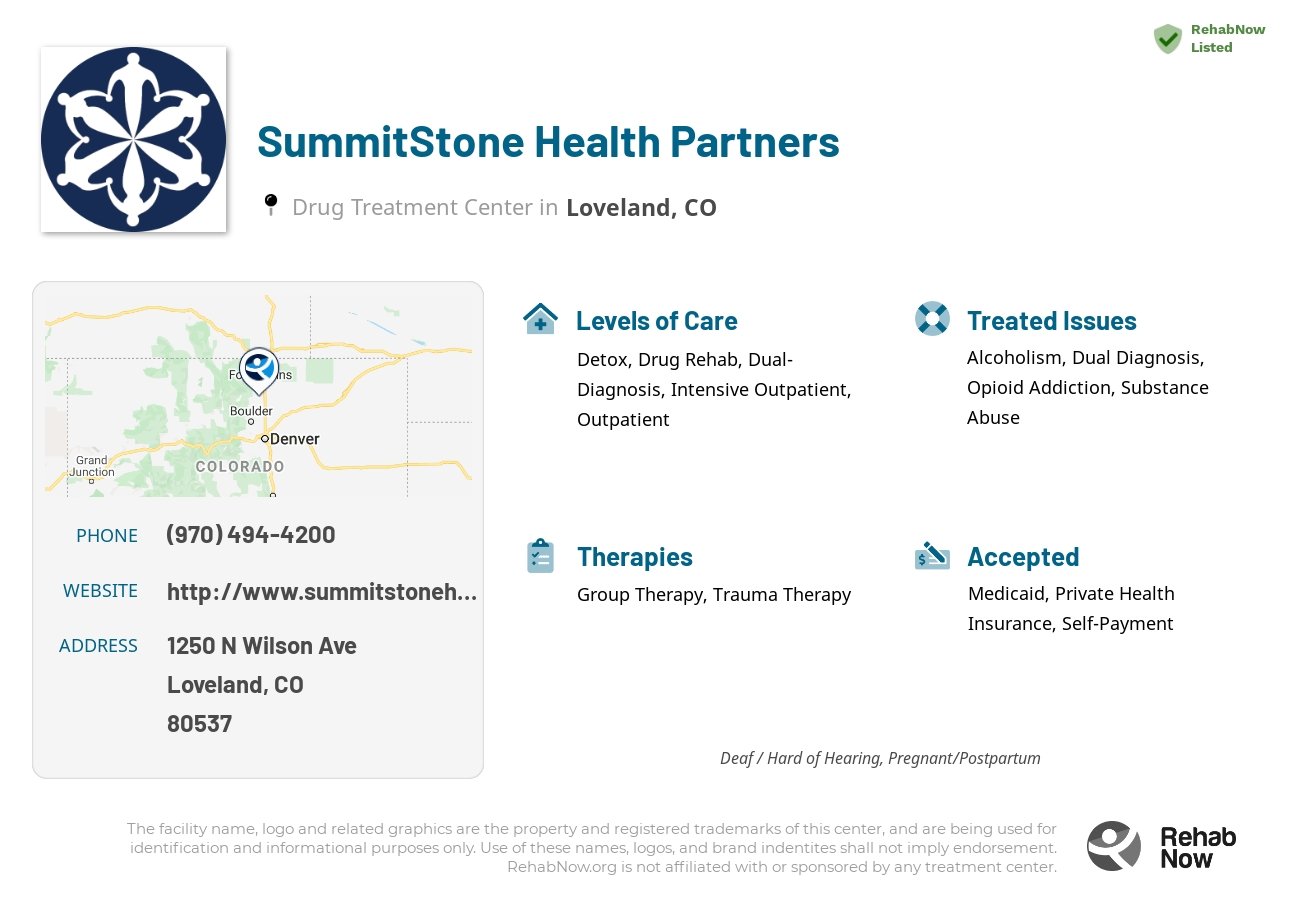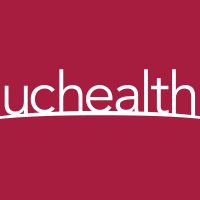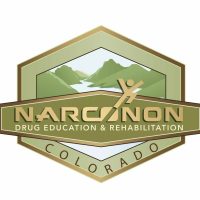SummitStone Health Partners
Drug Rehab Center in Loveland, Colorado
SummitStone Health Partners' drug rehab program combines evidence-based, holistic care modalities, detoxification services, dual-diagnosis options, and an Intensive Outpatient Program to help individuals achieve sobriety and long-term recovery with individualized, comprehensive case management and aftercare planning.
About
SummitStone Health Partners is a drug treatment center located in Loveland, Colorado that offers a range of services for individuals seeking sobriety. They specialize in treating alcoholism, opioid addiction, substance abuse, dual diagnosis, drug addiction, and mental health issues. The facility provides a variety of levels of care, including detox, drug rehab, dual-diagnosis treatment, intensive outpatient programs, and outpatient services. SummitStone Health Partners accepts private health insurance, making their services more accessible to those needing help with addiction and mental health challenges. With their expertise in dual diagnosis treatment and comprehensive approach to recovery, SummitStone Health Partners is committed to helping individuals find lasting sobriety and improved mental well-being.
SummitStone Health Partners in Loveland, Colorado offers various services and treatment methods for addiction and substance abuse. They provide detoxification programs to safely manage withdrawal symptoms and help individuals begin their recovery journey. Additionally, the facility offers drug rehabilitation programs that focus on holistic healing and evidence-based therapies. With a specialization in dual diagnosis, SummitStone Health Partners addresses both addiction and mental health issues simultaneously, recognizing the interconnectedness between the two. Their intensive outpatient programs offer structured and comprehensive treatment outside of a residential setting, allowing individuals to continue their daily lives while receiving therapy and support. The facility also provides outpatient services for ongoing care and relapse prevention. Through their integrated approach to treatment and commitment to individualized care, SummitStone Health Partners aims to empower individuals to overcome addiction and achieve lasting recovery.
Genders
Ages
Modality
Additional
Conditions and Issues Treated
Recovering from substance abuse is an essential part of a healthy life for many people. It’s a long and challenging process, but it can be worth it in the end if you manage to get through all parts. Detoxifying your body, rehabilitation after that time passes or when needed (depending on what type), and then recovery while also receiving therapy support throughout this entire process.
A standard route to starting recovering from substance abuse and addiction is through a detoxification center. There you can completely heal your body and mind and continue on the path of recovery without feeling any of the lingering effects of substances.
Within the past decade, opioid addiction has become a nationwide epidemic. The United States hosts one of the world’s highest rates of opioid use or abuse and has one of the highest rates of opioid-related deaths. In the United States, opioid drugs are classified as Schedule II-IV controlled substances due to their highly addictive properties and potential for abuse. These include morphine, opium, heroin, oxycodone, hydrocodone, methadone, and fentanyl. Physicians usually prescribe opioids to help control pain.
Over time, opioid users develop a tolerance for the drugs, which makes it difficult, if not impossible, to function without them. In turn, opioid users often resort to illicit means of obtaining the drugs. These means can include drug dealers, friends, and family members who do not have legitimate prescriptions for the drugs. Opioid addiction can quickly lead to heroin use, especially those seeking more intense highs than prescription opioids offer. Due to the high risk of overdose, heroin users are at a much higher risk for illness and death.
A person who struggles with addiction and a mental health condition suffers from a dual diagnosis. This means that they have two issues that must be treated. The specific mental health issues that the patient at SummitStone Health Partners might have include but are not limited to:
- Depression
- Bipolar Disorder
- Anxiety
- PTSD (Post Traumatic Stress Disorder)
The specific addiction issues that the patient might have include but are not limited to:
- Alcoholism
- Drug Addiction (i.e., Cocaine, Meth, and other stimulants, Marijuana, and Ecstasy)
The combination of the two illnesses can be tough to treat. Taking care of one or the other is tough, and taking care of both cannot be done alone. A patient who receives dual diagnosis treatment will be given the best chance at becoming sober.
Levels of Care Offered
This center offers a variety of custom treatment tailored to individual recovery. Currently available are Detox, Drug Rehab, Dual-Diagnosis, Intensive Outpatient, Outpatient, with additional therapies available as listed below.
Detoxification is a critical first step in treatment for drug addiction. Drug detoxification helps the individual withdraw from the drug by providing a controlled environment where symptoms can be managed through medication and close observation. Detoxification is an inflection point where the individual can get on a recovery track, but it’s also one of the most dangerous points in the recovery process.
In addition to going through physical withdrawal from certain drugs, a detox program also provides the individual with drug testing to monitor their progress. This way, if the individual is not ready for sobriety (such as if they relapse), the treatment professionals can catch it early on and use that opportunity to help re-orient the individual towards recovery.
Intensive Outpatient Programs are similar to partial hospitalization, but they don’t require the patient to go home each night.
This means that while they have to attend meetings and receive other types of help at the facility, addicts are allowed to keep their jobs or continue with school without having to miss their classes or work opportunities. This is a great option for those who can’t take time away from their jobs or schedules to attend a treatment program.
During this type of program, the addict will be required to meet with counselors and other types of professionals throughout the day. This will help them stay on track and prevent them from relapsing after they leave the facility.
An outpatient treatment program is set up to help with alcohol or drug addiction or a co-occurring disorder. The treatment must attend the treatment facility for their therapy and other programs but return home each night. The frequency of mandatory attendance decreases after much of the treatment program is complete. The treatment programs are monitored by the treatment facility and case managers who work for a judge or judge’s office. A treatment program may be performed out of a treatment facility, treatment clinic, or treatment center.
The benefits of outpatient treatment programs are many. One of the most beneficial treatment programs is that it allows treatment for clients who cannot afford or may not be able to attend treatment at a treatment facility, treatment center, or treatment clinic full-time. Another benefit of treatment programs is that they reduce crime rates because treatment allows people to treat their addiction.
Therapies & Programs
Individualized Treatment is essential because it gives addicts the ability to participate in a program that meets their unique needs. An addict should work with professionals who understand what they’re going through, especially if the addict is actively using. Finding the right treatment program for an addict is difficult, but it’s even harder without communicating with those who have experience treating your specific situation.
Group therapy sessions provide recovering addicts with a chance to cope with everyday situations that many face. Group therapy sessions are held in rehab facilities, clinics, churches or community centers that offer drug addiction treatment.
People who attend these groups are encouraged to voice their feelings and support other addicts in recovery. This helps group members strengthen their own recovery program while cheering on others who are struggling with sobriety.
Trauma therapy allows them to work through past trauma to have peace of mind and begin down the road of sobriety. The therapist will work with the individual to help them understand their past and present relationships. Patients may often believe that something is inherently wrong with them or they are unworthy of love. The therapist aims to correct these negative feelings and behaviors by helping the person realize that their actions do not reflect who they truly are.
Dialectical behavior therapy, or DBT, is one form of cognitive behavioral treatment. This type of therapy typically involves both individual and group sessions with a therapist on a regular basis.
It uses concepts like mindfulness training to help addicts learn how to identify their thoughts, feelings, behaviors and the experiences that trigger them so they can avoid relapse. DBT also teaches addicts how to regulate their emotions, which can make it easier for them to avoid or overcome negative thoughts and cravings.
Patient Experience
Experiential Therapy at SummitStone Health Partners
Drug addicts can benefit from experiential therapy, which involves real-time activities to process trauma and emotions. This type of therapy is available at SummitStone Health Partners and can help reduce the need to resort to drugs and alcohol. Activities may include role-playing, use of props, and others. The individual learns to release suppressed thoughts that lead to negative feelings and embrace the present moment. Experiential therapy is beneficial in treating various disorders, including drug addiction, eating, and behavioral disorders.
Payment Options Accepted
For specific insurance or payment methods please contact us.
Is your insurance accepted?
Ask an expert, call (888) 674-0062
SummitStone Associated Centers
Discover treatment facilities under the same provider.
- SummitStone Health Partners - Estes Park in Estes Park, CO
- SummitStone Health Partners - Fort Collins in Fort Collins, CO
- SummitStone Health Partners in Estes Park, CO
Learn More About SummitStone Centers
Additional Details
Specifics, location, and helpful extra information.
Loveland, Colorado 80537 Phone Number(970) 494-4200 Meta DetailsUpdated November 25, 2023
Staff Verified
Patient Reviews
There are no reviews yet. Be the first one to write one.
Loveland, Colorado Addiction Information
The Centennial State has slipped to a ranking of 12th in the country for drug abuse. Each year around 24% of the state's population uses illegal drugs while nearly 5% of its population abuses alcohol. Substance-related deaths in Colorado were responsible for 15.12% between 2008 and 2017. Fortunately, Colorado drug and alcohol addiction treatment are available to help a person overcome addiction.
About 10% of adults in Loveland, CO are current illicit drug users. There are 4,300 young people addicted to alcohol or other drugs. About 40% of the individuals who are addicted to heroin in Loveland started by abusing prescription opioids. The average age for drug use initiation in Loveland is around 14 years old. Drug rehab facilities can help addicts overcome their addiction and improve their chances of long-lasting sobriety.
Treatment in Nearby Cities
- La Jara, CO (221.4 mi.)
- Crested Butte, CO (145.9 mi.)
- Boulder, CO (28.4 mi.)
- Castle Rock, CO (72.8 mi.)
- Ignacio, CO (265.2 mi.)
Centers near SummitStone Health Partners
The facility name, logo and brand are the property and registered trademarks of SummitStone Health Partners, and are being used for identification and informational purposes only. Use of these names, logos and brands shall not imply endorsement. RehabNow.org is not affiliated with or sponsored by SummitStone Health Partners.











